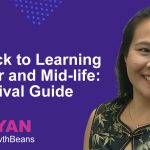One key element to performing well is understanding what employers are looking for with each question and knowing how to present your experiences and qualifications. Interview questions are designed to help potential employers better understand who you are as a person and what skills and talents you bring to the table. Therefore, it is essential to be well-prepared.
In our list of interview questions and answers, we’ll address everything from why employers ask certain types of questions to what they are looking for in a prospective candidate’s response and strategies that may help put your mind at ease while answering tough queries. So get ready—it’s time to prep yourself for an interview!
Looking for a new role? Explore over 100,000 jobs available on MyCareersFuture now!
1. Tell me about yourself.
What are interviewers looking to learn about you?
They want to get an overview of your background and experience. This includes your education, relevant work experience, and other skills or qualifications that might be relevant to the position you are applying for. This helps the interviewer to understand if you are a good fit for the job they are hiring for.
What should you share?
To answer this question, briefly describe your educational background and any relevant work experience you have. From there, you can talk about your current job or position (if applicable) or your freelance experience or volunteer work. Finally, it would be best to express your interest in the place and the company, explaining why you think you would be a good fit for the job.
The key to answering this question successfully is to be confident, concise, and straightforward. By doing so, you can effectively communicate your qualifications and interest in the position.
Read More: How to Answer That “Tell Me About Yourself” Question (Sample Answers Included)
2. Why do you want to work here?
What are interviewers looking to learn about you?
Firstly, the interviewer hopes to gauge your genuine enthusiasm for the position and whether you see it as a good fit for your skills, experience, and career aspirations.
Secondly, the interviewer wants to ensure that you understand the role and the company well.
Thirdly, the interviewer is interested in learning about your potential for growth and contribution within the role.
Find your next job on MyCareersFuture. We have over 100,000 job opportunities daily for you.
What should you share?
It would be best if you expressed your enthusiasm about how your skills and experience align with the specific skills and experience sought by the employer. This includes your past achievements and expertise that corresponds to the role requirements.
You should express your eagerness to learn, grow and contribute to the company’s success. It would be best if you shared your aspirations for professional development and how you see yourself contributing to the team’s goals in the future.
You should highlight your motivations for applying for the role and why you believe you’re a great match.
For this question, it is crucial to tailor your response to the specific company and role, avoiding generic responses and focusing on aspects unique to the company, the industry, and the particular responsibilities of the role. By demonstrating that you have done your research on the company and clearly understand what the position entails, you will show your proactive approach and willingness to invest in learning about the opportunity.
Read More: Best Interview Answers: ‘What Interests You About This Role?
3. Why should we hire you?
What are interviewers looking to learn about you?
Firstly, they want to know your unique qualifications and value proposition that make you a perfect fit for the role.
Secondly, the interviewer wants to gauge your passion and enthusiasm for the industry and the specific role.
Lastly, the interviewer seeks confidence and self-awareness in your response. They want to see your belief in your abilities and readiness to take on the challenges and responsibilities of the role.
What should you share?
You should highlight your most compelling strengths and experiences. Be sure to mention any specific achievements, skills, or expertise that directly align with the job description requirements.
You should also convey genuine excitement about the company and its mission, signalling your commitment to the industry and long-term career goals. Explain how your interests and aspirations align with the company’s direction and the challenges you are eager to tackle.
You should speak confidently about your strengths, accomplishments, and potential contributions whilst demonstrating self-awareness by acknowledging areas for development and expressing your commitment to continuous learning and growth.
Read More: Why Should We Hire You? This is How You Answer With Confidence
4. What are your strengths?
What are interviewers looking to learn about you?
First and foremost, the interviewer wants to gauge your self-awareness and ability to identify your strengths. This question demonstrates your understanding of your skills, abilities, and positive attributes, and it reveals whether you have taken the time to reflect on your strengths and how they can be applied in a professional setting.
It’s also important to keep in mind that the interviewer is looking for strengths that directly align with the specific skills and experience sought for the role. By highlighting your strengths that closely match the requirements of the part, you can show that you are a strong fit for the position and capable of making significant contributions.
What should you share?
You should first reflect on your past experiences, accomplishments, and positive feedback to identify your core strengths. Next, you’ll need to review the job description to determine the critical skills, qualities, and experience required for the role. From that, you’ll be able to identify the strength you’ll need to highlight in this interview.
When sharing your strengths, it’s best to use specific examples from past experiences to illustrate how you effectively applied your strengths to achieve positive results. It will demonstrate to your interviewers the real value you can bring to the company and how you can make a meaningful impact.
Finally, share your commitment to further developing your strengths and exploring new areas of expertise, demonstrating your growth mindset and eagerness to learn.
By crafting a tailored and compelling response that highlights your strengths, their impact, and your growth potential. This, in turn, will increase your chances of making a positive impression on the interviewer and securing the position.
Read Here: How Do You Identify Your Strength?
5. What are your weaknesses?
What are interviewers looking to learn about you?
The interviewer wants to assess your understanding of your ongoing development and growth potential. Essentially, they want to see how you handle challenges and your overall personal and professional development approach.
What should you share?
This question is an opportunity to showcase your commitment to growth and development.
Firstly, it’s crucial to acknowledge that everyone has areas where they can improve. Therefore, it’s essential to highlight some of the things you’re working on to ensure you’re always striving for better.
Think about a specific weakness that you’ve recognized in yourself and share how you’re actively working to overcome it. For example, one of my weaknesses is public speaking. However, I’ve taken several courses and joined a public speaking club to improve my skills. I’ve also volunteered to speak at company meetings and events to get more practice. While I still get nervous, I’ve seen a significant improvement in my ability to communicate effectively and confidently in front of others.
By sharing a specific weakness and the actions you’re taking to improve, you not only demonstrate self-awareness but also a commitment to professional growth. It shows that you’re not afraid to tackle challenges and are willing to put in the effort to better yourself. So, don’t be afraid to be vulnerable and authentic when responding to this question, and remember to focus on the progress you’ve made instead of just the weakness itself. And, express your enthusiasm for addressing these areas and becoming more well-rounded and professional.
Read Here: How to Positively Answer Interview Questions About Your Weaknesses
6. Where Do You See Yourself In 5 Years?
What are interviewers looking to learn about you?
You have taken the time to research the company and evaluated it as a place where you can grow and develop over the next five years.
The interviewer wants to understand your career goals and determine the company’s compatibility, where you can grow and develop over the next five years. Whether it can provide for your growth and if you can be happy and successful there.
What should you share?
When answering the interview question “Where do you see yourself in 5 years?” it is important to have a well-thought-out plan that is both achievable and aligns with the company’s growth trajectory. You can demonstrate your commitment to their goals and vision by researching the company’s size and future aspirations.
For instance, if the company is a start-up that aims to expand its operations, indicate your willingness to be part of the growth process. You can say, “In five years, I see myself as a vital contributor to the company’s growth plan. I look forward to being part of the team that will help the company expand into newer markets and revolutionise the industry.”
On the other hand, if the company is a large corporation, mention how your role can evolve within the organisation. You can say, “Five years from now, I see myself in a leadership position within the company. I plan to leverage my skills and experience to help drive innovation, spearhead projects and lead teams that are key to the company’s success.”
It is essential to keep your answers concise, specific, and relevant to the company’s goals. You want to demonstrate your ambition and passion for the job while showing how your goals align with the company. Doing so will signal to the interviewer that you are the best candidate for the role and someone worth investing in.
Read in-depth on The Best Sample Answers to “Where Do You See Yourself in 5 Years?”














